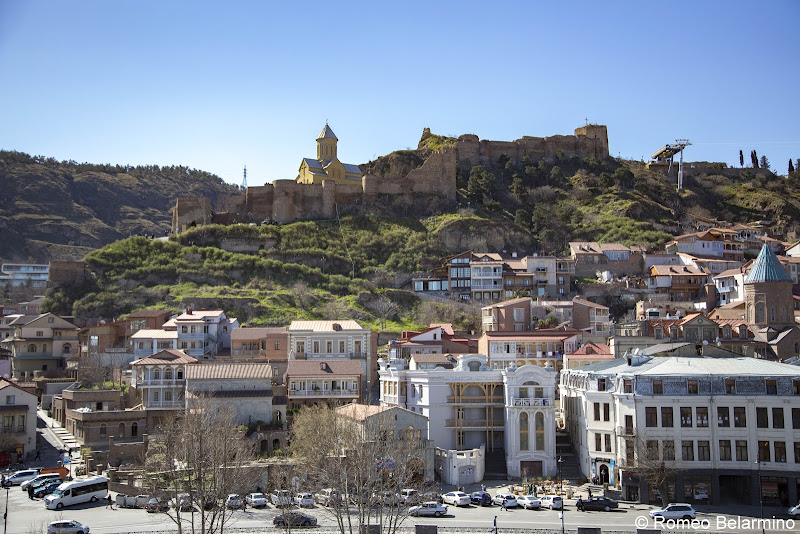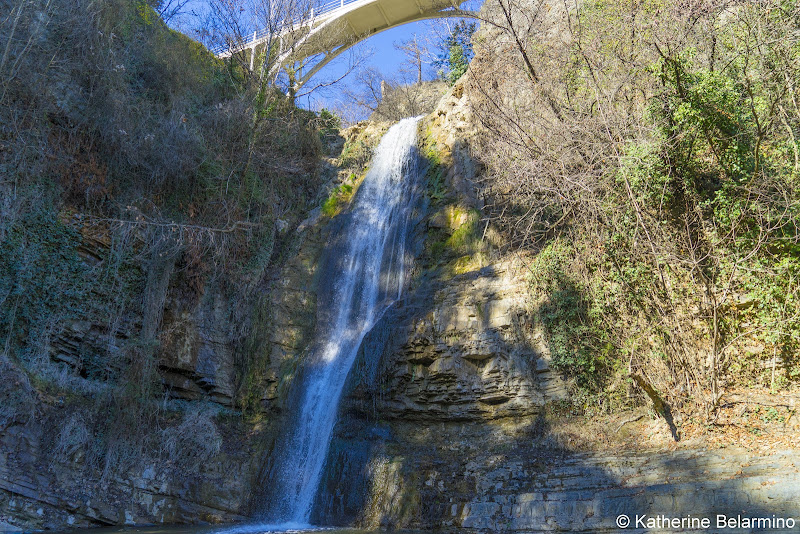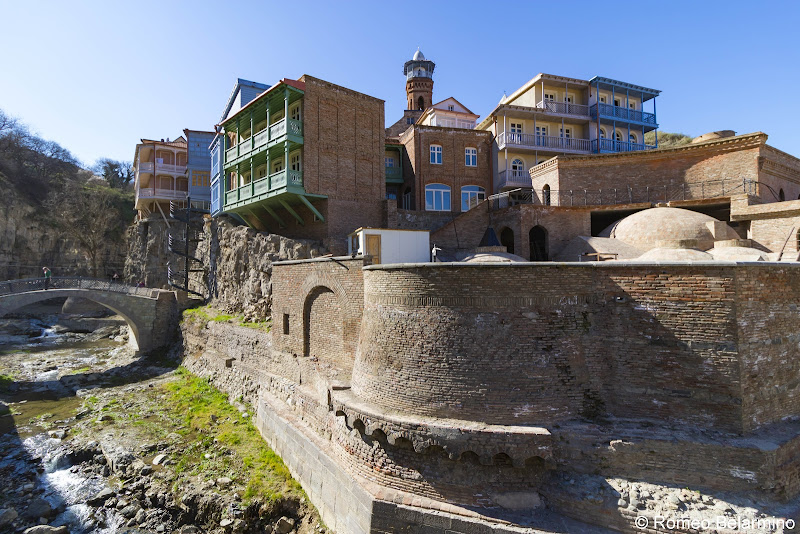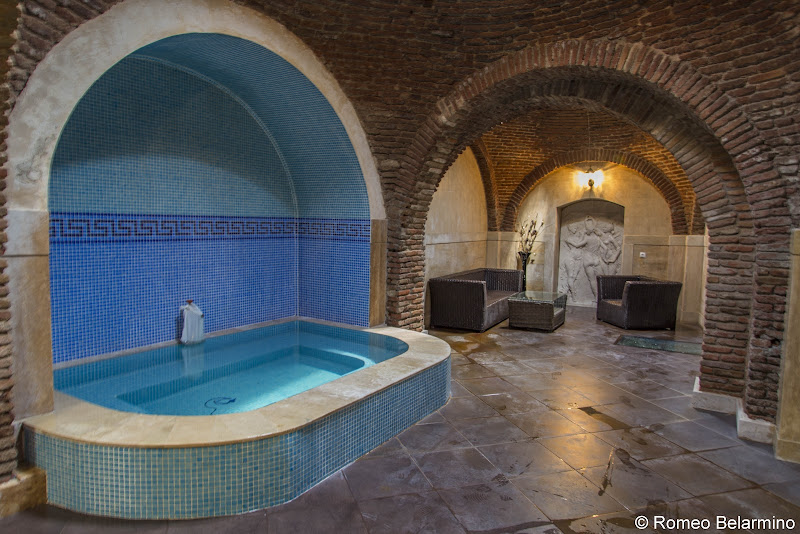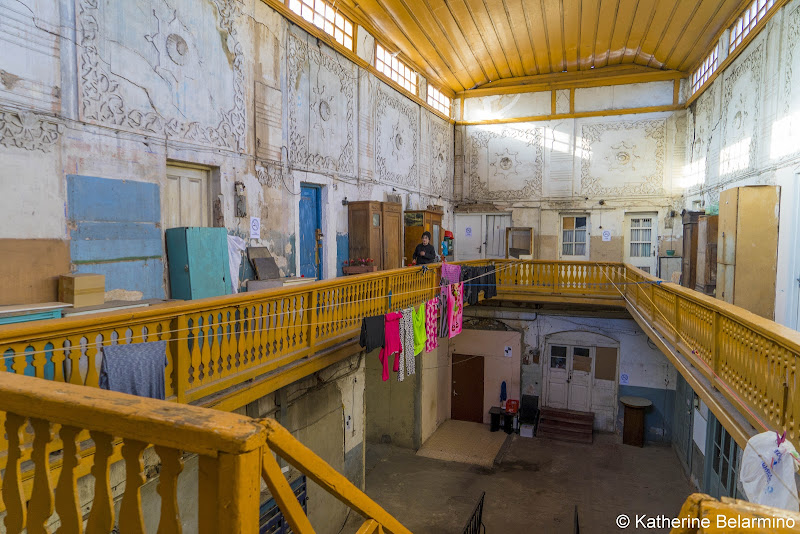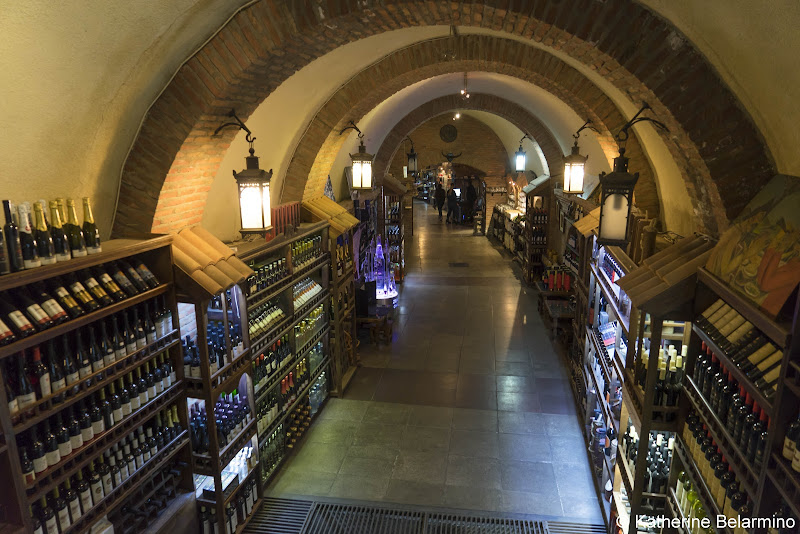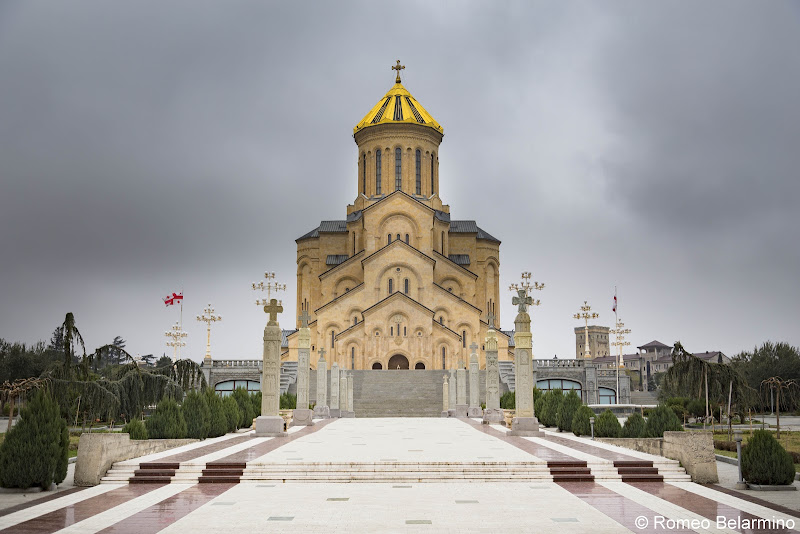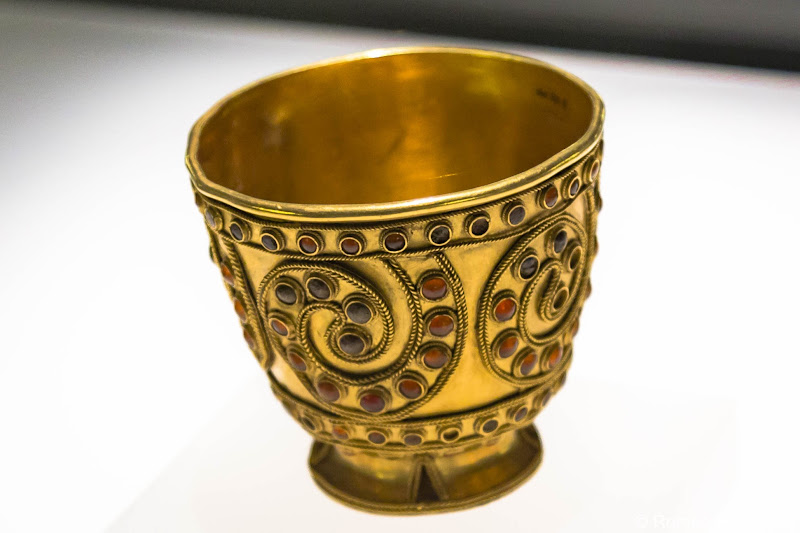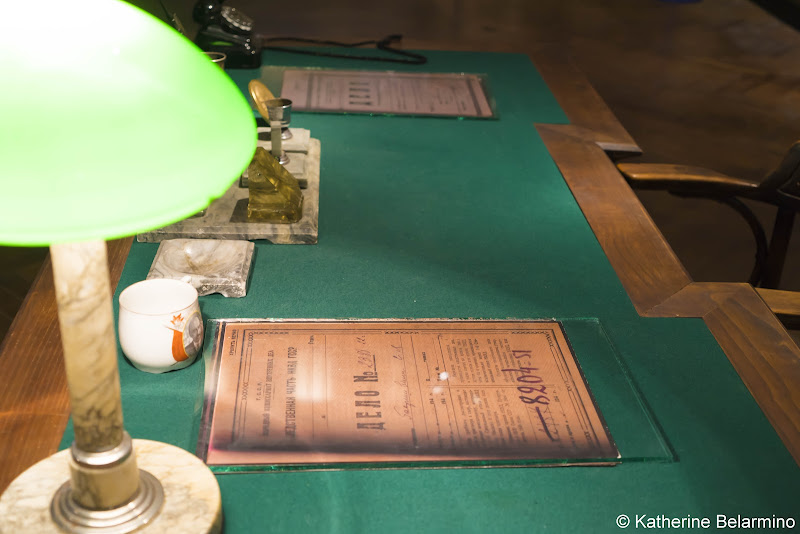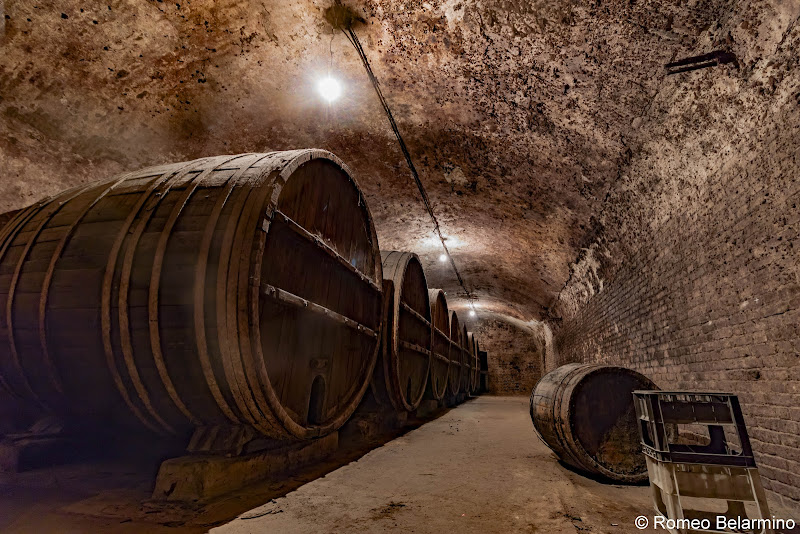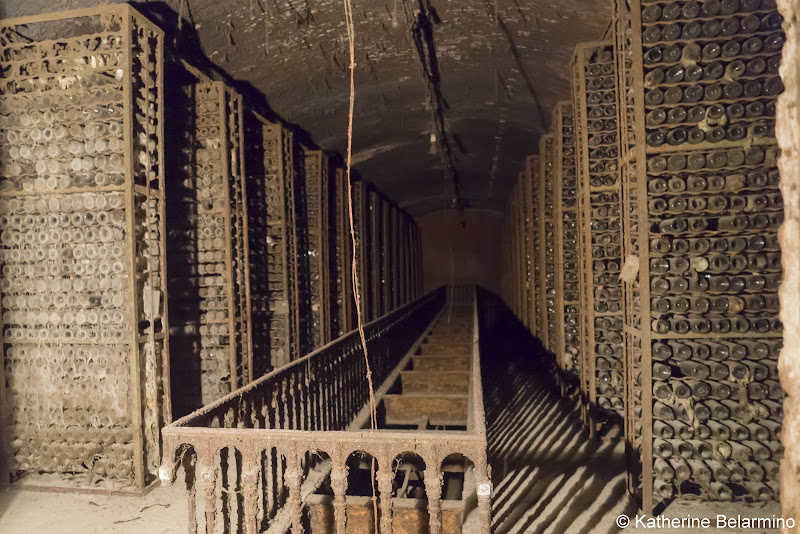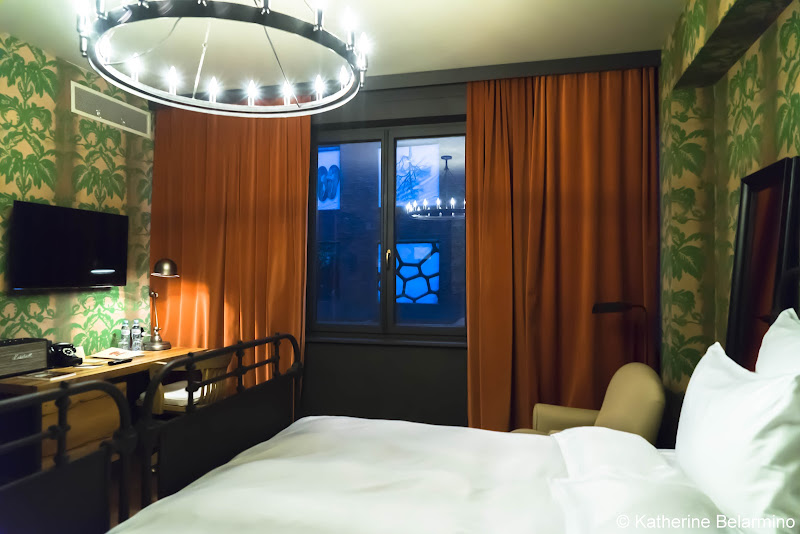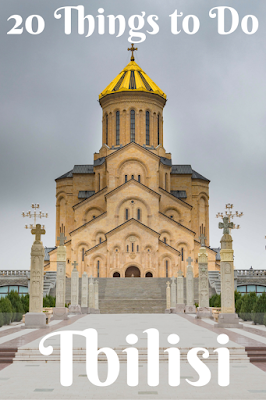Tbilisi, the capital city of the country of Georgia, can be a little intimidating at first. Tbilisi is a big, sprawling city with a mix of ancient sites, crumbling architecture, colors, both muted and vibrant, and new, modern structures that pop up amongst the old. The city is long, like a horn, as it is situated in a canyon. Most of the streets wind and curve, sometimes becoming alleys and occasionally even turning into flights of stairs. The main streets are wide and the flow of traffic is never-ending. Tbilisi has a palpable heartbeat and is buzzing with energy. But once you get acquainted with Tbilisi, it becomes easy and feels familiar, and there are so many things to see and do in Tbilisi to keep travelers occupied for days.
Metekhi Church of Assumption and King Vakhtang I Gorgasali Statue
The story of Tbilisi starts with King Vakhtang I Gorgasali, also known as Vakhtang Wolf’s Head because he had a wolf’s head on his helmet. Vakhtang Wolf’s Head was king of Iberia (eastern Georgia) from the mid-fifth century to the early sixth century. There are different versions, but, basically, the story goes that Vakhtang Wolf’s Head was hunting for pheasants. He shot one and sent his eagle to fetch it. When his eagle didn’t come back, he went after it to find that both had been boiled in hot springs. He was so impressed with the hot springs, he decided to build a city around them. The name Tbilisi means “warm location.” Overlooking the Mtkvari River which runs through the middle of Tbilisi is Metekhi Church as well as an imposing statue of King Vakhtang I Gorgasali.
Narikala Fortress
Just a short walk from Metekhi Church is a cable car that climbs to the top of the hill across the river. On this hill is the Narikala Fortress. Its name means “small fortress.” This fortress was first built in the fourth century. However, it, along with Tbilisi, has been destroyed and restored many times. The final blow was in 1827 when it exploded from the gunpowder stored inside.
Kartlis Deda (Mother Georgia) Monument
Also at the top of the hill near the fortress is Kartlis Deda, a statue of Mother Georgia. She is a symbol of Tbilisi. This tall aluminum statue is dressed in traditional Georgian dress. She holds a bowl of wine in her left hand for friends and a sword in her right hand for enemies.
National Botanical Garden of Georgia
Behind the Narikala Fortress is the National Botanical Garden of Georgia. The botanical garden provides a natural respite from the hustle and bustle of the city. We visited in March, so there wasn’t much in the way of flowers, but the botanical garden does have two waterfalls.
Tbilisi Mosque
Georgia is an Orthodox Christian country. Georgia was the third country to accept Christianity as its official religion. However, Georgia is proud of its religious diversity, and while its population is mostly Christian, it also includes Muslims and Jews. The Tbilisi Mosque is an example of this religious diversity and acceptance as both Shiite and Sunni Muslims worship together in the same Mosque. One side is for Shiites and the other side is for Sunnis, and the two sides are separated only by a couple columns.
Sulfur Spring Baths
In the Abanotubani (“bath district”) neighborhood across the river from the statue of Vakhtang Wolf’s Head are the Sulfur Spring Baths. The hill above Tbilisi is known for its hot sulfur springs, which run at 20 to 50 degrees Celsius. These are the springs that prompted Vakhtang Wolf’s Head to build the city. The sulfur baths are still an important part of Tbilisi’s culture. The baths are easy to spot as they are low buildings with red brick domes.
You can either go into a public bath or you can rent a private bath by the hour. Some of the private baths are quite nice, with a cold pool, a warm pool, a sauna, and a place to lay and get an added service of a massage or scrub. Baths open early and stay open late at night.
Old Tbilisi’s Art Nouveau
A highlight of our time in Tbilisi was taking a walking tour of old Tbilisi and peeking into the old Art Nouveau buildings. Who knows how long some of these buildings will continue to stand. Many of them were private homes that have since been turned into apartment buildings, so the entryways can be entered while walking around old Tbilisi.
Caravanserai
An important part of Tbilisi’s history is its location along the Silk Road. A piece of the Silk Road that remains today in Tbilisi is the caravanserai. When you’re up at the Narikala Fortress, below you can see some buildings that are big rectangles with an open courtyard inside. These are remaining caravanserais. A caravanserai was like a B&B for traders. Traders would travel along the Silk Road with their camels and their goods. They would stop and stay at these caravanserais which had ramps in the courtyards that descended below ground where the camels would stay. The goods they had brought for trade were stored on the ground floor in storage rooms, and the traveling traders stayed in what were basically hotel rooms in the top floor of the same building as their goods and camels. These caravanserais were in business until the 1800s when the railroad came through. We got to peek into one of these buildings that now acts as an apartment building upstairs and a bar called KGB Still Watching You downstairs.
Tbilisi Sioni Cathedral
Tbilisi Sioni Cathedral is named after Mount Zion in Jerusalem and was the biggest church in Tbilisi at the end of the 5th century. That church was destroyed by the Persians and David the Builder built the current church in the early 12th century. The Russian iconography was painted in the mid-1800s. The church holds a grapevine cross, a symbol of Saint Nino, a Cappadocian woman who converted the Georgian King Vakhtang III to Christianity.
Meidan Bazaar
Another relic of the Silk Road is Meidan Bazaar. This may be one of the oldest business centers in Georgia. It may have been in use as early as the 4th and 5th centuries and it was a trade market on the Silk Road. A flight of stairs leads down into this underground shopping area. The market has been repurposed and now offers wine tasting and the possibility to purchase Georgian wine, Georgian cheese, churchkhela, jewelry, and other Georgian souvenirs.
Related: Georgian Cuisine: 30 Traditional Foods to Try in Georgia
Related: Georgian Cuisine: 30 Traditional Foods to Try in Georgia
Bridge of Peace
Some people call the Bridge of Peace Georgia’s tampon. While I can see what they’re saying, I kind of like the juxtaposition of the modern Bridge of Peace and new theater buildings amongst the old. At night, the Bridge of Peace is lit with dancing white lights.
Holy Trinity Cathedral of Tbilisi (Sameba)
The Holy Trinity Cathedral of Tbilisi, commonly called Sameba, is the largest cathedral in the Caucasus and towers over Tbilisi. The cathedral can be seen from numerous points around the city. The architecture of the cathedral is inspired by traditional Orthodox Church architecture, but it is also the first of its kind. The head of the church wanted Sameba to last forever and ordered excavation until rock was found on which to lay the foundation. Rock was found at 30 meters, so the cathedral has a 30-meter foundation.
Sameba is actually churches within a church. As expected, there is a church on the main floor, but we followed stairs down to a stark underground church. There are a number of interesting items to be found in the main church, including a copy of the Panagia Portaitissa or Iviron icon. Legend has it the icon was put into the Black Sea to save it from being destroyed by the Byzantine iconoclasts and floated upright to Greece, where it was recovered from the sea by a Georgian monk and taken to the Georgian Iviron monastery on Mount Athos. The icon will remain on Mount Athos until the apocalypse. Another item of note is an altarpiece that tells the history of Georgia. The coat of Jesus in the altarpiece is covered in diamonds.
Anchiskhati Basilica of Saint Mary
Sheltered behind a fence and a bell tower is Anchiskhati Basilica of Saint Mary, the oldest church in Tbilisi. Anchiskhati Basilica was built by King Dachi, son of Vakhtang Gorgasali, in the 6th century. The name of the church comes from the icon of Ancha which was moved from the Ancha monastery in what is now Turkey to the basilica to protect it from the Ottomans. The icon is now on display at the Georgian Museum of Art.
Rezo Gabriadze Theatre
The Rezo Gabriadze Theatre staged its first puppet show in 1981. The theater was founded by Revaz “Rezo” Gabriadze, an artist, writer, and director. These puppet shows aren’t for children. The first show in the theater was a combination of The Lady of the Camellias and La Traviata performed by marionettes. The Gabriadze Theater company has toured in places like New York, Washington, D.C., Edinburgh, Toronto, and Paris. The theater is easily recognized by the fantastical clock tower that was added in 2011 for the 30th anniversary. Gabriadze built the tower, covering it with whimsically decorated tiles. Every hour an angel rings the bell with a small hammer. At noon and 7:00 p.m., an additional puppet show called “The Circle of Life” plays.
Georgian National Museum
The Georgian National Museum has many exhibitions related to Georgia’s history. One exhibition which should not be missed is the exhibition of the Archaeological Treasury. This exhibit displays gold and silver items from 3000 BC through 400 AD that were discovered in Georgia. Georgia’s treasure is available for public viewing because of the actions of Ekvtime Takaishvili, a Georgian archaeologist and national hero. When the Soviets invaded Tbilisi in 1921, the Georgian government was evacuated to France along with Georgia’s treasures. Takaishvili accompanied the treasure to France and preserved Georgia’s treasure, protecting it from being divvied up between the museums of the world. Even though he lived in poor conditions in France, he did whatever he could to protect Georgia’s treasure, including from a Nazi search during World War II. In 1945, at the end of the war, Takaishvili and Georgia’s treasure returned to Georgia.
The Soviet Occupation Museum
The Soviet Occupation Museum is currently in the same building as the Georgian National Museum, but will move to its own building in the near future. The Soviet Occupation Museum chronicles the Soviet occupation of Georgia from 1921 through 1991. The occupation is obviously a huge part of Georgia’s history. The exhibit is artfully put together with objects, photos, and documents and tells the stories of Georgians personally touched by the occupation.
Kashveti Church
Kashveti Church is another Georgian Orthodox Church in Tbilisi. Kashveti roughly translates to giving birth to a stone. Its name came from a monk of the 6th century that was accused by a woman of making her pregnant. The monk said that if she was lying, she would give birth to a stone, which she did.
A striking detail of Kashveti Church is the frescoes by Lado Gudiashvili. Lado Gudiashvili was a Georgian painter of the early 1900s. His paintings had a signature style, with people having very distinct and unique almond-shaped eyes. This style can be seen in Mary and the baby Jesus. This is a very different presentation of Jesus and Mary than is seen in other churches. They seem very human and of this world, rather than spiritual and ethereal. Our guide Anna said Georgians paint gods like humans and humans like gods.
Georgian National Opera Theater
One of Georgia’s iconic buildings is the Georgian National Opera Theater. The opera house recently reopened after a long renovation to heal the scars left by the Soviet occupation and Georgia’s civil war. The opera house is part of Tbilisi’s collection of art nouveau and was even the inspiration for one of the buildings that used to be a private mansion. Even if you can’t get inside for a performance, you can view the architecture, peak in the windows, and enjoy the unique statues that can be found around the building outside.
Tbilisi Wine Factory #1
Georgia has been making wine for thousands of years. Of course, you can sample Georgian wine at any of Tbilisi’s restaurants, but a unique introduction to Georgian wine in Tbilisi is offered by Tbilisi Wine Factory #1. The historic factory was financed by David Sarajishvili, the brandy king of Georgia, designed by Alexander Ozerov, the Georgian architect, and built in 1896. The basement contains a museum of wine, 40,000 wine bottles including from the private collections of Napoleon, Stalin, and Romanov, all under lock and key by government order. The basement also contains ginormous Soviet-time wine barrels and enameled wine tanks.
In addition to this wine museum, Tbilisi Wine Factory #1 offers wine tasting, workshops in making dumplings or candy, a selection of restaurants, and a boutique hotel, Art Hotel Winery 1896.
Getting Around Tbilisi
A lot of the things to do in Tbilisi are within walking distance, especially in old Tbilisi. Crossing the street can be tricky. Georgians are pretty aggressive drivers and they don’t like to stop for anyone or anything. When crossing the street be sure to make eye contact and even put a hand out to let them know you will be crossing. Big streets like Rustavali Avenue have tunnels every few blocks to get from one side to the other, otherwise, you’d never get across the street. Fun fact, drivers don’t turn left in Tbilisi. They have to drive for blocks and blocks until they get to a built in u-turn or a roundabout.
Walking around Tbilisi feels safe, including at night. We walked one night from old Tbilisi all the way back to our hotel in new Tbilisi. However, taxis are also easy to find at Freedom Square and they’re inexpensive, just be sure to have where you want to go written down in Georgian by someone at your hotel in case the driver doesn’t speak English. Tbilisi also has a metro system.
Where to Stay in Tbilisi
We stayed at the Rooms Hotel Tbilisi and absolutely loved it. The Rooms Hotel Tbilisi is just off of Shota Rustaveli Avenue and less than two kilometers from Freedom Square and Old Tbilisi. The hotel has all the comforts and amenities of a modern hotel with the coziness and uniqueness of a boutique hotel.
While Tbilisi can be intimidating when you first arrive, we feel sure that you’ll fall in love with Tbilisi, and the rest of Georgia, like we did. All it takes is getting out there, walking around the city, meeting the people, eating the food, and visiting the physical pieces of Tbilisi’s history, both old and new.
This article contains affiliate links. If you book through these links, it costs you nothing extra and we earn a small commission which goes towards running this website and bringing you more travel stories.
This article contains affiliate links. If you book through these links, it costs you nothing extra and we earn a small commission which goes towards running this website and bringing you more travel stories.
Thank you to the Georgian National Tourism Administration for hosting our trip to Georgia and making this post possible. As always, all opinions are my own.


